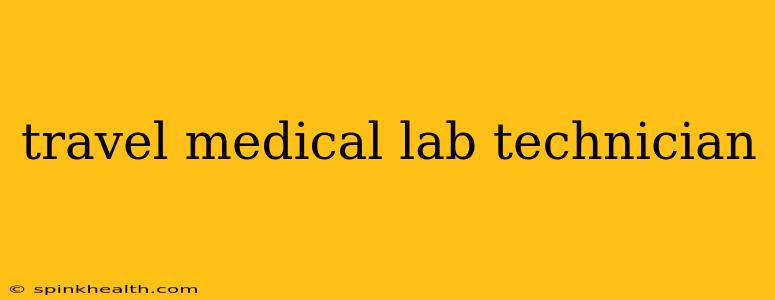The sterile gleam of a microscope, the quiet hum of a centrifuge, the rush of adrenaline as you decipher a critical result – these are the hallmarks of a medical lab technician's life. But what if you could experience this fulfilling career while exploring the world? That's the exciting reality for a travel medical lab technician. This isn't your typical nine-to-five; it's a journey of discovery, both professionally and personally. Let's delve into this unique and rewarding career path.
What Does a Travel Medical Lab Technician Do?
Imagine yourself, not confined to one lab, but traversing diverse landscapes, each assignment presenting new challenges and opportunities. As a travel medical lab technician, your responsibilities mirror those of a traditional lab tech, but with a significant dose of adaptability and independence. You'll perform a variety of tasks, including:
- Collecting and processing samples: This involves everything from drawing blood to preparing specimens for analysis, adhering to strict protocols in diverse settings.
- Performing lab tests: From basic hematology and urinalysis to more complex molecular diagnostics, your skills are constantly put to the test.
- Maintaining equipment: Ensuring all instruments are calibrated and functioning optimally is crucial for accurate results, no matter the location.
- Analyzing results: Interpreting data and communicating findings to healthcare professionals is a vital aspect of patient care, demanding accuracy and attention to detail.
- Adhering to safety protocols: Strict adherence to infection control and safety guidelines is paramount in every setting.
How Do I Become a Travel Medical Lab Technician?
The path to becoming a travel medical lab technician begins with a strong foundation. You'll need:
- Education: An associate's or bachelor's degree in medical laboratory technology or a related field is usually required.
- Certification/Licensure: Passing relevant certification exams (like ASCP) and obtaining the necessary state licensure is essential for practicing legally.
- Experience: While not always mandatory, some prior experience in a clinical laboratory setting will make you a more competitive candidate for travel assignments.
- Adaptability and resilience: This career demands a flexible and problem-solving mindset. You'll need to quickly adapt to new environments, equipment, and procedures.
What Are the Benefits of Being a Travel Medical Lab Technician?
The rewards extend far beyond a paycheck. This career offers:
- High earning potential: Travel assignments often come with competitive salaries and benefits packages.
- Opportunities for professional growth: Exposure to diverse settings and technologies fosters continuous learning and skill development.
- Exploration and adventure: See the world while pursuing your passion – experience new cultures, meet diverse people, and create unforgettable memories.
- Work-life balance: Travel assignments often come with set durations, offering potential for extended breaks between contracts.
What Are the Challenges of Being a Travel Medical Lab Technician?
While the perks are undeniable, it’s important to acknowledge the challenges:
- Relocation: Frequent moves can be demanding, requiring adaptability and a willingness to embrace the unknown.
- Being away from home: Extended periods away from family and friends can be difficult.
- Varied work environments: Some locations might have less advanced equipment or different working conditions.
- Managing logistics: Arranging housing, transportation, and other logistical aspects requires careful planning.
What Kind of Salary Can I Expect as a Travel Medical Lab Technician?
Salaries for travel medical lab technicians vary greatly depending on location, experience, and the specific assignment. However, they tend to be significantly higher than those of staff lab technicians. Researching different agencies and locations will help determine typical compensation ranges.
How Do I Find Travel Medical Lab Technician Jobs?
Several agencies specialize in placing medical professionals in travel assignments. Researching these agencies and networking within the medical community are effective strategies for finding suitable positions.
What Kind of Skills Do I Need to Be a Successful Travel Medical Lab Technician?
Beyond technical skills, success hinges on:
- Strong problem-solving abilities: Troubleshooting equipment malfunctions or adapting to new procedures is crucial.
- Excellent communication skills: Effectively communicating results and collaborating with colleagues is paramount.
- Time management skills: Juggling multiple tasks and meeting deadlines within diverse settings requires efficiency.
- Independent work ethic: You will often work independently and need to be self-motivated and resourceful.
The life of a travel medical lab technician is a vibrant blend of professional fulfillment and personal exploration. It's a challenging but ultimately rewarding career path for those with a passion for diagnostics and a spirit for adventure. If you're a dedicated lab professional with a thirst for discovery, this could be your perfect career.

